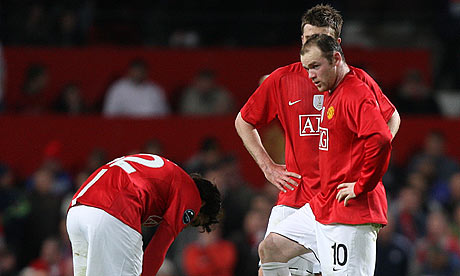Despite their huge squad, Sir Alex Ferguson's men look dangerously like a team who have shot their bolt
Dejected Manchester United players look bewildered after Porto's late equaliser shifted the balance of the tie in their favour. Photograph: Mike Egerton/EMPICS Sport/PA Photos
Winning is a desirable habit but it's less advisable to become too attached to one particular method. A quirk of the Uefa computer means that Manchester United have become accustomed to playing the away leg first in Europe and that fact was painfully apparent in their draw with Porto at Old Trafford tonight.
Like a cricket team who are much more successful when batting second, United seemed to have no awareness of how to set a target, as you are supposed to do if the first leg is at home. Would 2-1 be acceptable? 1-0? United struggled to calculate the appropriate degree of risk, and the consequence was an infectiously ramshackle contest: unusually in the modern game, both teams wanted to score one more than the other rather than concede one fewer. Never mind a victory: in the end, United were fortunate to get 2-2.
There were strong shades of another 2-2 draw in the first leg of the semi-final against Bayer Leverkusen in 2002. As then, an injury-affected United were unfocused and, perhaps, subconsciously complacent. Certainly the crowd, a whinging shower who gave one of the worst displays ever, seemed to think they just had to turn up and swing a boot on the seat in front as their side won 24-0.
United went out on away goals in the second leg of that Leverkusen match and, strangely, it is a decade since they won a European knockout tie in which the first leg was at home; even then they had to win in Juventus to go through. Since then they have played 14 knockout ties; in only four of those did they play at home in the first leg, and they went out each time. By contrast, United have won the last six matches in which they have played the first leg away from home. It's a nice fit for a team who are so capable on the counter-attack, but having to dictate play from the start seemed to frazzle their brains.
The confusion was confounded by a palpable nervousness that was supposed to have been blown away by Federico Macheda against Aston Villa on Sunday. If anything United were worse tonight. In the opening 30 minutes certain players, particularly Michael Carrick and Paul Scholes, looked like they had the yips. It was unusual enough to see those two misplace passes; that they were misplacing them by yards was utterly surreal.
Rank defending is becoming a more familiar sight when United play: in the first half an hour they were remarkably incompetent, and should have been at least 3-1 down to an excellent and admirably intrepid Porto side. Up until they hosted Liverpool last month they had conceded seven goals in the previous games; since then they have conceded 10 in four.
Injuries and suspensions do not help but, even with such a powerful squad, United are starting to look dangerously like a side who have shot their bolt in this most congested of seasons. Already they have played 53 games, with at least another 10 to come. Carrick looks completely gone, while Scholes is in the sort of slump that, at his age, tends to prompt career obituaries. Gary Neville's should have been written a year ago.
Such fatigue is often the case at the business end of a long season. United limped over the line in their Treble season; Arsenal's Invincibles won only four of their last 12 games in all competitions; Blackburn's champions lost three of their last five. "When it goes," Ferguson said as that Blackburn side started to wobble, "it goes quickly, and there is nothing you can do about it." Those words look truer than ever now.



